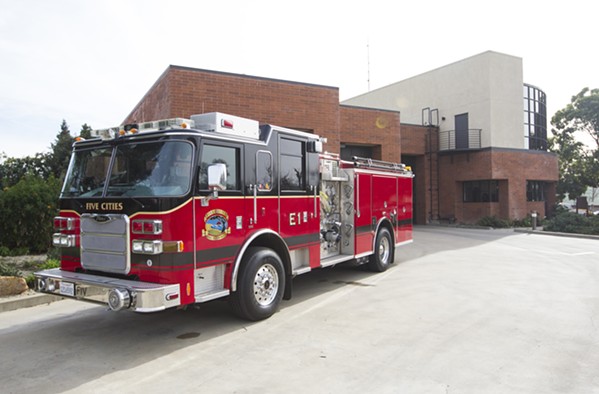[{
"name": "Ad - Medium Rectangle CC01 - 300x250",
"id": "AdMediumRectangleCC01300x250",
"class": "inlineCenter",
"insertPoint": "8",
"component": "2963441",
"requiredCountToDisplay": "12"
},{
"name": "Ad - Medium Rectangle LC01 - 300x250",
"id": "AdMediumRectangleCC01300x250",
"class": "inlineCenter",
"insertPoint": "18",
"component": "2963441",
"requiredCountToDisplay": "22"
},{
"name": "Ad - Medium Rectangle LC09 - 300x250",
"id": "AdMediumRectangleLC09300x250",
"class": "inlineCenter",
"insertPoint": "28",
"component": "3252660",
"requiredCountToDisplay": "32"
}]
San Luis Obispo County's third-busiest municipal department is about to become even busier as its remaining members grapple with a future devoid of the Oceano Community Services District.
The Five Cities Fire Authority (FCFA) officially entered a "wind down period" now that Oceano voters rejected the flat parcel tax that would have supported emergency fire and medical services in the region. The move withdrew the district from the FCFA, leaving the cities of Arroyo Grande and Grover Beach behind to work together and review the desired level of services and funds needed to provide continuous care to its residents. Oceano's removal will be effective when the wind down period ends on June 30, 2023.
At a little more than $5.7 million, the FCFA budget isn't allocated to specific fire stations. Arroyo Grande City Manager Whitney McDonald said that each party is responsible for maintaining the fire station in their respective jurisdiction. So, the community services district's exit will not affect the amount of funding allocated to the stations.
However, both Grover Beach and Arroyo Grande city managers told New Times that higher costs are expected in the new iteration of the FCFA.
"The parties are evaluating options at this time. It is highly likely that Arroyo Grande will need to pay more for fire service than it is currently paying, and much of this need is related to the fact that the FCFA has been required to operate without any additional contributions from the three member agencies since 2019 based on the terms of the second and third amendments to the joint powers agreement [JPA]," McDonald said.
The JPA is a binding agreement that the three jurisdictions entered in 2010. The parties executed the third amendment in July 2020 following the defeat of the flat parcel tax when it initially appeared on ballots. It also continued current funding levels so that Oceano could have another go at passing the special tax this summer.
Funding fees for the FCFA have been consistent for each agency for the past three years. Arroyo Grande pays the lion's share at 45 percent, which totals to more than $2.5 million. Grover Beach and Oceano pay 35.14 percent and 19.85 percent, respectively.
"The funding formula distributes costs to each of the three member agencies based on a combination of three criteria, including population, calls for service, and the number of fire stations and personnel located in each jurisdiction," McDonald said. "The current cost allocations were intended to be transitionary and take into account the limited staffing currently available at station three in Oceano. If the ballot measure were to have passed in Oceano, a different funding formula would have been used going forward that allocated costs to each agency based on the three criteria outlined above in a proportionate manner."
Grover Beach City Manager Matthew Bronson told New Times that ongoing priorities for both cities include determining and distributing the assets owned by or in possession of the FCFA, like fire engines and capital equipment within fire stations.
At the July 25 Grover Beach City Council meeting, FCFA Chief Stephen Lieberman told attendees that per capita cost and the percentage of the respective city's general fund invested into the authority was low when compared to other organizations in the county. But with the FCFA fielding more than 4,000 calls per year—making it the busiest municipal department in SLO County after the cities of SLO and Paso Robles—Lieberman said more funds are welcome.
"COVID was a huge uncertainty to all of us and had a huge impact to all of us as emergency responders providing pre-hospital med care. It was rough and we continue to respond to people who are sick today," he said. "Holding the funding at a constant level for three years while costs are going up, whether it's field costs, employer-related cost and insurance, workers' compensation, all of those non-controllable business-related expenditures, I've done my best to manage with a flat budget. I've been able to use some unanticipated revenue when the crews go out to these major fires, but, as you can imagine, as city budgets have increased over the last three years, this one stayed flat." Δ
Latest in News
Comments
Showing 1-1 of 1
Readers also liked…
-

Coast Unified teachers upset over new position's salary and qualifications
Oct 20, 2022 -

SLO police identify alleged driver who hit and killed couple
Dec 22, 2022 -

When the levee breaks: Oceano residents, county officials walk a tightrope of regulations to manage Arroyo Grande Creek, which some say led to the levee's failure in January
May 18, 2023








